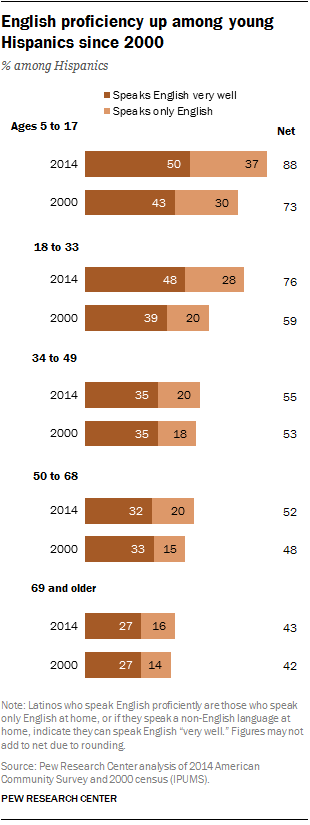
English proficiency among U.S. Latinos has risen over the past 14 years, an increase almost entirely due to the growing share of younger Hispanics born in the U.S., according to a new Pew Research Center analysis of Census Bureau data.
When asked about their language use and English proficiency in 2014, some 88% of Latinos ages 5 to 17 said they either speak only English at home or speak English “very well,” up from 73% who said the same in 2000.
And among Latinos ages 18 to 33, the share who speak only English at home or say they speak English “very well” increased from 59% to 76% during this time.
Increasing English use by young Hispanics has been driven in large part by demographics. More Hispanics in the U.S. today were born in the country than arrived as immigrants (the number of newly arrived immigrants from Latin America has been in decline for a decade). For example, 65% of Latinos in 2014 were U.S. born, compared with 60% in 2000. One consequence of this trend is that a greater share of young Hispanics ages 5 to 17 are growing up in households where only English is spoken – 37% in 2014 compared with 30% in 2000.
By comparison, English proficiency among older Latinos has changed little since 2000. For instance, among Latinos ages 34 to 49, 55% spoke English very well or only spoke English at home in 2014 – nearly unchanged from 2000, when the share was 53%. Among Latinos ages 69 and older, just 43% said they spoke English proficiently in 2014, compared with 42% in 2000.
Even as more Latinos speak English proficiently than in the past, many also speak Spanish. The Pew Research Center analysis shows that 36.7 million Latinos speak Spanish at home, making Spanish the most spoken non-English language in the U.S. Looked at another way, three-in-four (73%) Latinos say they speak Spanish at home.
Despite the rise of English among U.S. Latinos, nearly all say they value the ability to speak Spanish, with 95% saying it is important to them that future generations of U.S. Latinos speak the language. Still, as English use rises, most Latinos say Spanish doesn’t define their identity: 71% say speaking Spanish is not necessary to be considered Latino.
You can see a statistical portrait of the nation’s Hispanic population here that documents key demographic and economic trends from 1980 to 2014.
